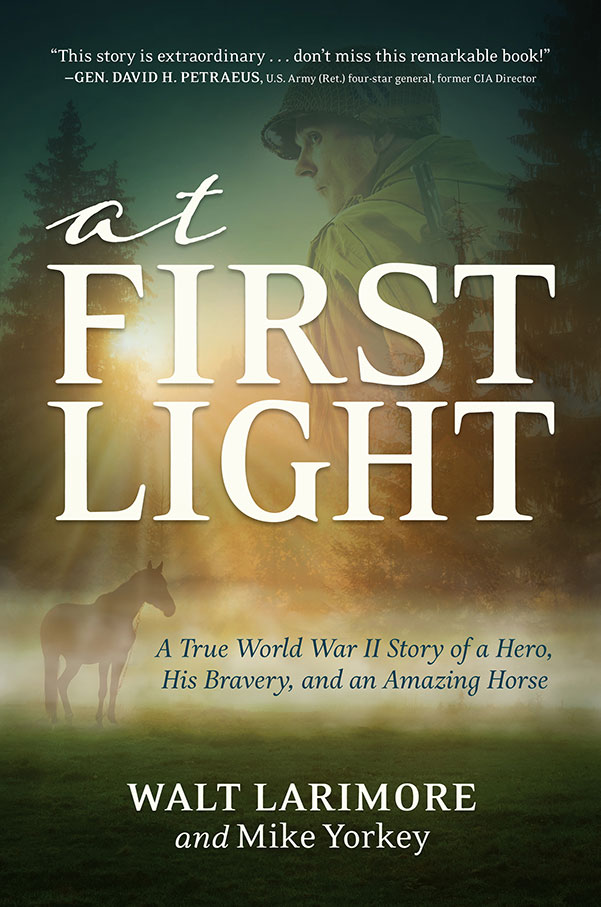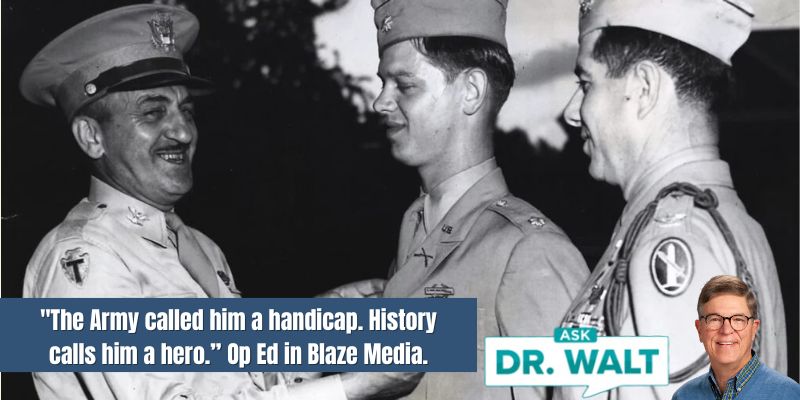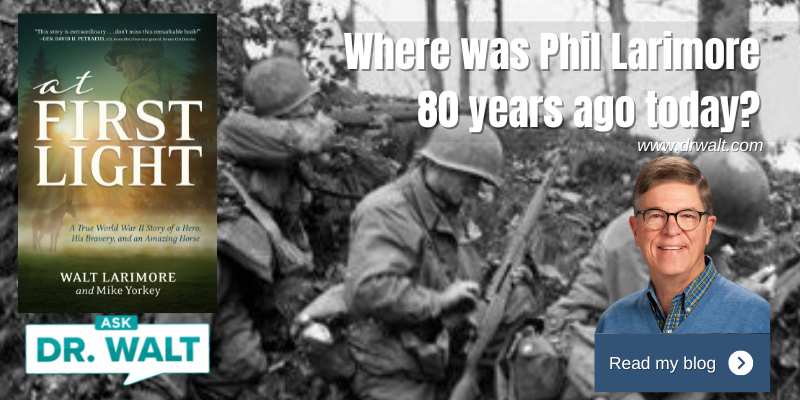
October 27, 1944 – Part One – Facing 600 of Germany’s best infantrymen in a battle to the death
October 27, 2024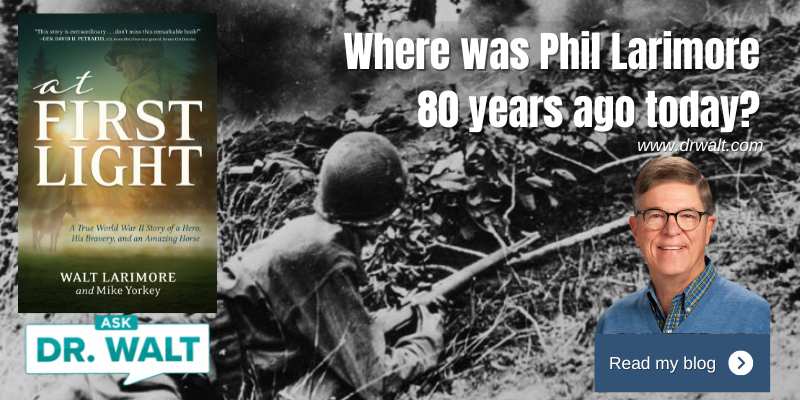
October 28, 1944 – Part One – Phil defies death at point-blank range
October 28, 2024October 27, 1944 – Part Two – Facing 600 of Germany’s best infantrymen – Phil is seriously wounded
Just after midnight, Greer’s raiders were attacked by dozens of fanatical enemies, who charged again and again from the west, south, and east of their south-facing ridge, probing for a weak point. One enemy soldier made it past a raider OP[1] before being cut down by a rifleman.[2]
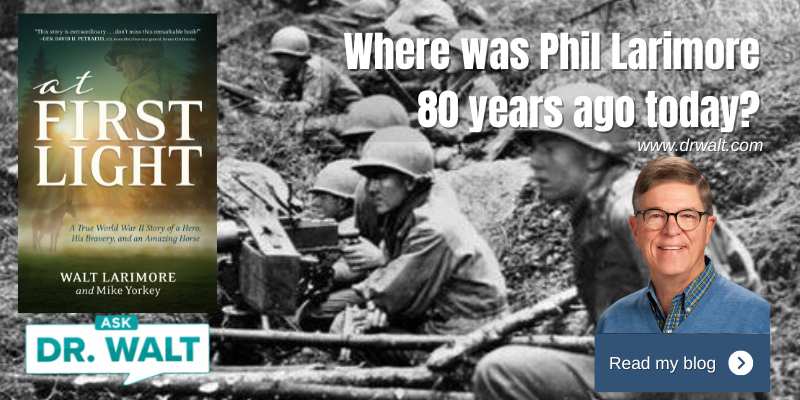
Phil and Private Happy Vales quickly joined the ferocious battle. The superior enemy numbers drove a wedge between the raiders and the rest of Task Force Greer, thus isolating the raiders. Although the enemy was supported by at least five machine guns and countless machine pistols laying down intense fire, they were repeatedly beaten back.[1]
Phil was thankful he had decided to lay down the wire and mines, which effectively helped the raiders repel one unsuccessful drive after another, along with hand grenades and gunfire.
The Germans attacked again and again. Failing one spot, they would simply shift to another. Because of the dense darkness and endless sheets of heavy rain, accompanied by an eerily thick fog, the GIs never knew where the next attack was coming from until a land mine exploded or the Germans began raking the path of attack, often a matter of yards from the camp perimeter.
Because they were surrounded and cut off from their supporting task force, Lieutenant Morris had Phil command one half of the Raiders while he commanded the other. Due to the lousy weather, they knew there was no way they could call in air, artillery, or armored support. At one point, after a BAR automatic rifleman was killed near Phil, he raced over and grabbed his still-smoking rifle.
Although the attackers were firing directly at Phil, he began spraying the screaming and charging enemy from point-blank range. The enemy seemed to multiply in the firefight—as if two enemies sprung up for every one he shot down.
When he and Private Vales ran out of ammunition, they reached for hand grenades from their belts, pulled the pins, and let them fly. As the grenades exploded, a flood of fiery rounds and tracers blazed among the trees around them, shredding the bark, mud, and rock. Phil and Vales dove to the ground, but as Phil did so, he felt a sudden, searing pain in his right thigh, like someone had hit him with a giant baseball bat swung by powerful arms. The force knocked him backward.
As he was falling in the air—and for some reason, he could never explain whether it was instinctive or intuitive—he pulled out his .45 pistol.[2] Hitting the ground almost knocked his breath out of him, but at that moment, a German soldier leaped over the camp perimeter, spraying his machine pistol wildly. Phil steadied his .45 and unleashed three quick shots that exploded into the German’s chest, flinging him back onto the concertina wire. At least for the moment, the attackers retreated, likely to regroup and come at them again.
“Happy,” he quietly called to his partner. “I’ve been hit.”
Fear engulfed Phil since he knew they were surrounded and were at least a couple of hundred yards away from the task force and the nearest medic. In the dark, he couldn’t even see his hand in front of his face, but he could feel his warm blood soaking his long underwear and pants. Quickly pulling off his belt, he cinched it tightly around his right leg as a tourniquet, stemming the blood flow. Vales crawled over to him and used his fingers to explore the wound.
“Seems to be a clean ‘through and through,’ Lieutenant,” he declared. “Don’t think it hit bone. May have got an artery, but there’s no more bleeding.”
As he had been trained, and as he had done for dozens of his wounded men over the previous seven months, Phil had Happy pull out his first aid kit[3] from his belt, rip open a sulfa powder pack, sprinkle one-half of the powder on each wound, and then stuff a gauze pack into each hole. Happy then wrapped Phil’s thigh with a roll of gauze and had Phil swallow two sulfa tablets.
Phil loosened his belt tourniquet. To his relief, the gauze stemmed the profuse bleeding. He knew leaving the tourniquet on for too long could damage the nerves and tissues of the right leg, so he was relieved he could slacken it. But he left the released belt in place in case any further hemorrhaging began.
But does it really matter? he thought. The odds of getting out alive from this one are about zero![4]
TO BE CONTINUED TOMORROW.
~~~~~
[1] Larimore, At First Light, 159.
[2] The Colt .45 was a single-action, semi-automatic, magazine-fed, recoil-operated pistol that served as the standard-issue sidearm for the US Armed Forces and was widely used in World War II.
[3] Individual first aid packets were worn by each frontline solider. Each packet contained a tube of injectable morphine, eight sulfadiazine tablets, an envelope of crystalline sulfanilamide, first aid dressings, and a field tourniquet.
[4] Larimore, At First Light, 159-161
In case you haven’t read or listened to Dad’s book, you can learn more or order it here.
© Copyright WLL, INC. 2024.

